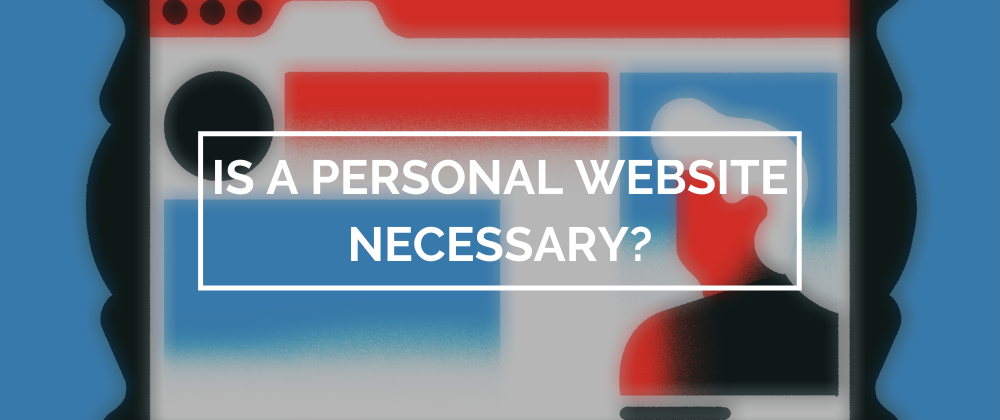As a student, I am always looking present myself as unique and creative to recruiters. One thing I have thought about doing was creating a personal website/portfolio.
A little background about me is that I am considering a career path in UX/UI research or possibly design (not too sure yet, but I am open to a variety of careers).
Here are some questions that I have:
- Is it necessary?
- If so, what should I include?
- How would you recommend creating the website?
Also I would love to see other peoples personal website, so feel free to link them!







Latest comments (77)
I maintain a website (which is mostly a blog plus landing page) after being convinced by reading Guzey's Why You Should Start a Blog Right Now. It is surprising how much better I understand topics once I've gone through the thinking process of writing a post. If someone else appreciates them (or contracts me on their basis), that is simply a bonus.
I use hugo for the blog, as it allows you to write without worrying about design too much, and the minimalist landing page is simply HTML and CSS.
Hi, I built my website to showcase my personal and professional projects, as a web developer I present some of my repositories from github and also the post from dev.to. I like the idea of having a portfolio where you showcase all the things your have done, almost like a link tree. baraus.dev
In my opinion, having a portfolio site, although not necessary definitely helps. It can be a great differentiator between you and similar candidates, which can be equally skilled or experienced but don't have one.
Although I didn't create my portfolio site, I did start writing my own blog (vojtechruzicka.com/) a few years ago. Arguably, this is much more powerful than a portfolio site (still, you can have both) as it does not show only your skills but also you enthusiasm and interest in the craft, which can be very important for potential employers. When looking for a candidate, it can be more important what's one's potential to growth rather than current skills. Actively blogging shows your passion, desire to learn, interest in the community, and in technology. A very small percentage of devs do blog, so it can be a very good advantage over other similar candidates. The biggest advantage, in my opinion, is how much you can learn through blogging. Every time I need to learn something new I write a post about it. It helps you solidify your understanding much better than just reading tutorials as you need a much deeper understanding of the topic to write about it. Later, you can go back to your own articles as a personal knowledge base or notes. This is a great source of learning as usually in your day to day job you get to interact with the same limited set of tools and technologies and blogging gives you an opportunity to learn outside of this bubble while providing some additional value. You'll get noticed more because of your blog/portfolio and you can get some interesting opportunities, new friends, and active engagement in the community. Starting was definitely one of my best career moves, I only wish I had started earlier :) Just remember, you don't need to have deep expertise on the topic, there are a lot of junior devs, which will find useful even entry-level topics. Hope this helps :)
You don't have to but
Keep it simple!
My personal site: offirmo.net
Other good read: vanschneider.com/a-love-letter-to-...
Website to Learn Python, Machine Learning, Data Science and Web development.
bit.ly/codeperfectplus
Hey, It's good to have portfolio website. Check Mine.
bit.ly/codeperfectplus
+1 on this. Well done, Jure, and congrats! I just hired a fresh-from-bootcamp coder myself, mostly on the basis of the strength of the portfolio site that they took the intiative to put together. And you're exactly right about "giving the interviewer a chance to talk about the decisions I made while making my website" - that's mostly what we talked about during our early interview, and it gave me a chance to see what this candidate could do.
Oh! Also also, if you have a personal/portfolio website, that gives you more control and advantage in mid-level screening interviews (after you make it through the basic HR screening, but before you get to the in-person actually-making-a-decision interview). When I do screens for candidates that have portfolios, rather than leading the interview with questions and hypothetical scenarios I come up with myself, I spend most of the interview more like, "Okay, give me your shpiel, and then walk me through your portfolio and let's drill down into some of your projects." I think this works well for people on both sides of the interview, and it turns the interview into a context for showing your strengths and what you could bring to the job, not enumerating your weaknesses.
A lot of people have chimed in here already with a lot of good input, but I'm going to talk too: I've been on both the searching and hiring side of a lot of job searches and interviews, and think I have some relevant experience.
Also,
I'm a senior back-end developer. My personal website (which I built both for personal reasons and with a view to getting hired) is at apjanke.net. Even though I'm a hacker, it just runs on SquareSpace. (And, despite my earlier advice above, I do not have a publicly-linked copy of my resume there. At the point in my career where I'm at, I already get too many contacts from recruiters, and I don't want to encourage more. As a new graduate, you will probably not have this problem!)
And your post has made me realize that I actually need a "Projects" page on my personal website, with links to my projects and open source work. Coming soon!
I guess, also, there is some risk here: Don't publish a bad personal/portfolio site with broken projects and links and the like. That can get you straight to a (probably deserved) "No Hire".
Also, this is about as much as I can say, but my company just got done with a round of hiring, and at least one of our new employees (including some fresh-from-school folks) definitely got hired primarily on the strength of their personal/portfolio websites.
Also, GitHub Pages runs Jekyll, is reliable and free, and works with custom domains! Good thing to consider if you want to go the cheap-but-works-well route.
Probably, but It's not the worst if you don't have one.
I kept it simple and with added some custom elements.
siddhant-misra.github.io/Portfolio/
My motivation for building biehler-josef.de was that I had several places where I publish content. Github for projects, Twitter for drawings and devto for blog posts. I wanted a place where all that stuff is aggregated into one site and thus I built my personal website.
In the last months I was looking for a small job besides my main job and it turned out that the website replaced a written application
Love the website, super simple and straightforward. Wow the website really paid off since you didn't have to do a written application and already had it made.
For people reading this who may be hiring developers:
I think all the upsides of having a portfolio have been well-outlined elsewhere in the discussion. Indeed, having a portfolio has obvious upsides.
But if you are hiring, please don't rule out candidates who don't have one. I have met several people in charge of a project who will only consider candidates with a portfolio or extensive work on open-source projects. I think this is counter-productive because there are lots of good reasons to not have a portfolio:
Again, by all means, if you want to make a portfolio, do it. It can be fun and can open doors, especially if you're a student. Just remember as you become a senior dev or move into management, not everyone who would be a great member of your team has the time or inclination that you have now.
For sure! Having a portfolio is a plus but only a plus. It Doesn't mean that some candidates are not as skilled, fit for the job, etc.
For the majority of my career my website has just been a better styled/interactive version of my CV and cover letter. Even now that I'm having a blog it still doesn't include any case studies or actual paid work. It's never been an issue, especially because most of my work has been paid software that's behind NDAs, do I can't really make the code public and would have to anonymize screenshots anyway.
Usually I write a cover letter in which I explain briefly what my skills are, what projects I've worked, what my roles were, and what kind of projects I'm interested in working on, and then mention I can walk them through my work in detail during a meeting.
The times I've been involved in the hiring process from the other side, I didn't care much to see a portfolio beforehand either. What's important for me is that before we have the interview, I get a clear picture of:
How that's communicated is less relevant to me. It just has to be done in a clean and understandable way. That can be a portfolio, an online cover letter, a video, a well organized github account (with extra context provided in a separate document), link to your blog, or anything else.
I do like seeing the actual work during interviews, but for me personally I don't need to see it upfront. And I haven't really come across a lot of places where having a portfolio makes a big difference.
Disclaimer, this is from a Norwegian perspective. I've also been applying and hiring for more senior roles. I notice hiring cultures tend to be quite different between different countries, and especially different from the US.
It's great to hear a perspective from the other side of the hiring process. All of those things you mentioned are super important and can be presented in various ways. Thank you so much for sharing and it's so cool to hear the hiring process from a different country! The US is a little bit different but all of the info is still extremely important.
I found it useful when I started doing freelancing, cause your work talks, people usually like to see what you have done. So I made my first one two years back, I dedicatedly spent a week's worth of work, made it from scratch using Django 😅 - ananto-haq.herokuapp.com/
But recently just spent a couple of hours to make a modern one using Stackbit - ananto.netlify.app/. You can also use static site generators like Gatsby and deploy on Github page or Netlify. I would suggest using an MDX CMS like NetlifyCMS, as you can use the markdowns as your CMS. So make one! 😃
Great thanks so much! I love both of your websites, the one you made on Django is super cool and I love the transitions. Ya I was thinking about doing Gatsby or and deploy it on Github or something. I actually used an HTML 5 UP site, but it's not up and running yet. You can check out my post on that if you would like!